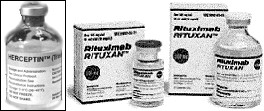|
Week of April 5, 2004 Blockbuster Deal from Site Selection's exclusive New Plant database |
|
LOOKING FOR A PREVIOUS STORY? CHECK THE ARCHIVE.
Tight Schedule, Owned Site Spur
By JACK LYNE, Site Selection Executive Editor of Interactive PublishingGenentech's $600M California Expansion
VACAVILLE, Calif. – The groundbreaking for Genentech's (www.gene.com) US$600-million, 570-employee manufacturing expansion in Vacaville, Calif., seemed as well-orchestrated as a scene from one of Gov. Arnold Schwarzenegger's (R) celluloid triumphs.
Rock-and-roll oldie "Taking Care of Business" blasted through the public-address system as Schwarzenegger strode to the podium. Before him was a sea of yellow hardhats, bobbing atop the heads of some 200 Genentech workers. "This is a huge win for our state," declared Schwarzenegger, a banner declaring "California: Open for Business" serving as a backdrop. "Genentech has the same faith in California that I brought to Sacramento." Clearly, landing the expansion is a huge business boost for California. It will create the world's largest biotechnology manufacturing facility in Vacaville (www.cityofvacaville.com), 54 miles (86 kilometers) northeast of San Francisco. But not everything went smoothly on the set at the groundbreaking. Genentech officials ditched traditional airy platitudes for some surprisingly frank talk. California's business climate, they bluntly declared, still needs work. A lot of it. The expansion, in fact, would've gone outside the state "if we weren't already here," Genentech President of Product Development Susan Desmond-Hellman said from the podium. "California is not competitive in business development," she continued. "Other states offer better financial incentives [for expansion projects]." Boilerplate groundbreaking rhetoric, it definitely wasn't. On the other hand, Desmond-Hellman used the occasion to strongly back the governor's goal of making California more business-friendly. Excess Land around Current Plant
So why did Genentech, with hordes of states and offshore sites dangling hefty incentives, still decide to expand in the Golden State?
Offered Fast Track for Rapid Ramp-Up The project's tight deadline had a lot to do with it. Genentech's bullish fortunes demand a rapid ramp-up in production capacity. The company's two biggest money-makers, Rituxan for non-Hodgkin's lymphoma and Herceptin for breast cancer, are enjoying strong sales. In addition, Genentech's new asthma, colon cancer and psoriasis drugs have all gained U.S. Food and Drug Administration approvals over the last nine months. And the company has more approvals working their way through the pipeline.
With its existing infrastructure, Vacaville offered a fast track, Desmond-Hellman explained. The company already owns a 96-acre (38-hectare) site in the city, which it purchased in the late 1990s. Significantly, that property includes more than Genentech's existing 427,000-sq.-ft. (38,430-sq.-m.), 550-worker manufacturing facility that the company built in 1998. The site also has a large swath of excess open acreage. Genentech will use 20 of the site's acres (eight hectares) to build three new buildings that will total 380,000 sq. ft. (34,200 sq. m.), said Desmond-Hellman. The additions will be located north of the existing manufacturing operation. Schwarzenegger Lobbied CEO
Even so, a proven site alone didn't make the project a slam-dunk for California.
The city of Vacaville offered Genentech a 10-year rebate on the property taxes for the expansion acreage. That, though, wasn't an awful lot, at least compared to the rich subsidies other areas were offering. Much more importantly, as Desmond-Hellman pointed out, the city moved to keep the biotech giant's plans on the fast track. Earlier, Genentech had secured all necessary permits while considering a much smaller expansion. Vacaville agreed to simply amend the previous permits for the far larger project. Project insiders also credited Schwarzenegger's convincing personal lobbying for sealing the deal. The governor called CEO Arthur Levinson in January and pleaded with him to expand in-state. "I said to Art, 'Today is a new day for our Golden State,' " Schwarzenegger recalled. " 'We are getting our fiscal house in order, and we are tearing down the walls that make it difficult to do business here in California.'
"I asked Art, 'Give me time, and you will see that we are getting California back on track,' the governor continued. "Now, we have the response from Genentech. They have decided not to move to another state and not to move to another country. They asked me to tear down the obstacles." Genentech Backing Biotech Incentives
South San Francisco-based Genentech hasn't been shy about speaking out about some of the obstacles it sees in California's current business climate.
The company is backing two bills before the California General Assembly that would've given it more assistance with its Vacaville expansion. Both pieces of legislation would provide state tax breaks for biotech companies that build manufacturing facilities. And California needs to lower its corporate tax burden, Genentech officials have said. "Biotechnology was born here," said Desmond-Hellman. "California should have a chance to keep those jobs in the state. You've got to give the governor the tools." The state's substantial biotech industry is coming to a crossroads, she added. California-based biotech companies have more than 200 experimental drugs in clinical trials, Desmond-Hellmann said. How business-friendly the state is will play a major role in where those companies decide to manufacture those drugs. Genentech hasn't yet announced when full-scale construction will begin. (The groundbreaking was strictly ceremonial.) But the company has already named the expansion project: Cell Culture Plant No. 2, or CCP2, an extension of CCP1, the existing manufacturing facility's name. Joked Schwarzenegger, "Sounds like a name out of one of my 'Terminator' movies." Now, on to an even tougher test: trying to make sure that California's biotech industry isn't terminated. Editor's Note: For more news on what's happening in the other end of the Golden State, watch for the Southern California Spotlight in the May 2004 Site Selection.
©2004 Conway Data, Inc. All rights reserved. Data is from many sources and is not warranted to be accurate or current.
| ||||||||||


